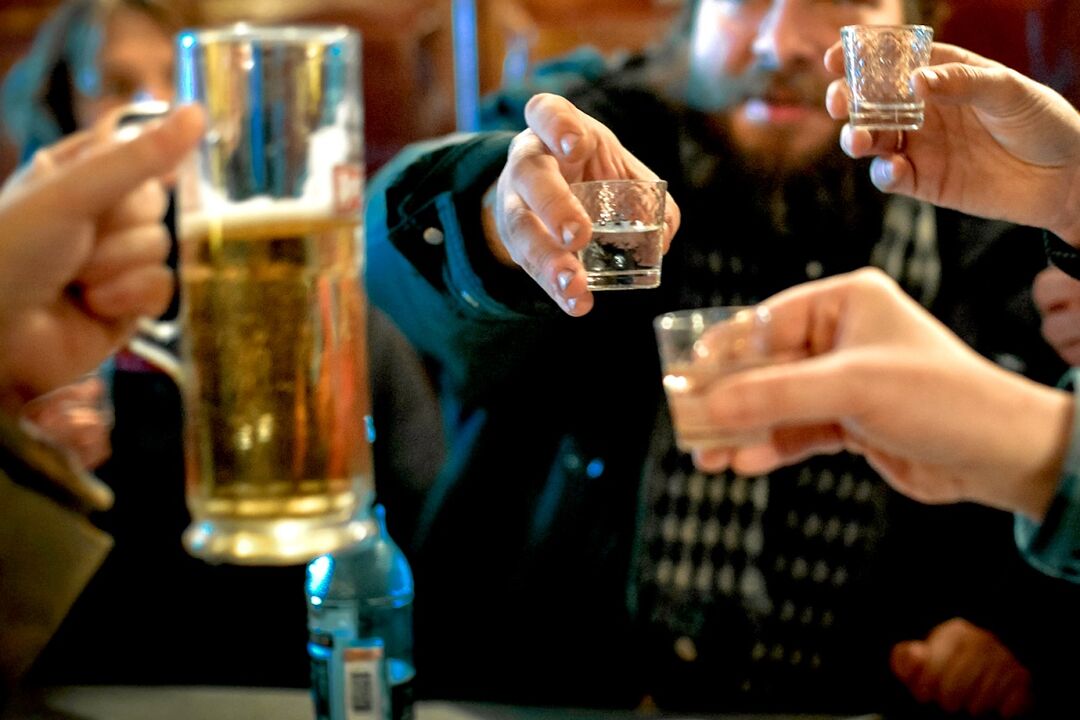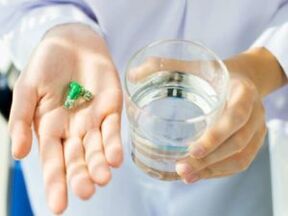
In general, alcohol has strong negative effects on the body. If you use it right after the antibiotic ends, the risk of problems increases significantly. Of course, in some cases the danger is minimal, but some drugs commonly used to treat serious illnesses are absolutely incompatible with alcohol.
During antibiotic treatment, doctors advise against drinking alcohol. Similar limitations are described in the instructions for use for each antimicrobial agent. If you drink alcohol after taking antibiotics, the effects of treatment may be diminished or minimized. Perhaps the development of adverse reactions and complications.
How long to wait after antibiotic treatment before drinking wine, vodka or even beer? Read more about this.
Antibiotics - what is this medicine
There are several main types of antibiotics. The simplest are made from organic raw materials, some are purely synthetic, and some are some sort of intermediate choice. Regardless of the category, all drugs help to slow the development of the pathogenic microbial community, inhibiting and destroying it.
The drugs in question should only be used for bacterial infections -- they don't work against viruses (even the flu) at all.
Antibiotics come in many forms:
- capsule;
- pill;
- ointment;
- injection;
- syrup.
Regardless, these drugs work the same way. And, even with external means, the main substance seeps into the bloodstream.
Can I drink alcohol after finishing my course of antibiotics?
When a person is ill, the doctor's main task is to ensure a speedy recovery. For this purpose, in addition to the drug, the following can be prescribed:
- diet;
- physiotherapy;
- Various add-ons.
At the same time, physicians are obliged to minimize the impact of any negative factors that might delay treatment, reduce its effectiveness, or cause complications. It is for this purpose that experts advise against drinking alcohol.
Any disease itself is a heavy burden on the immune system. In addition, many antimicrobials do not work well on internal organs. Therefore, determine their dosage and duration of administration as accurately as possible. Even in perfectly healthy people, oral alcohol can negatively affect the liver and kidneys. So, coupled with pathogens and antibiotics, it can extremely overload the aforementioned organs and increase intoxication.
Even if the course is complete, it's not worth rushing to catch up - doctors recommend waiting a while. So, in the accepted case:
- Regular antibiotics are allowed after at least 3 days (preferably 5 days);
- Long-acting medication - you need to wait at least 3 weeks.
Which antibiotics should not be used with alcohol
There are many kinds of medicines, and you must not drink alcohol while taking them.
Therefore, nitroimidazole is incompatible with alcohol. Their combination with ethanol triggers a disulfiram-like response, an acute intoxication used to code people who want to stop drinking.
In this case, it is best to start taking alcoholic beverages at least two days after the course ends.
The next group is fluoroquinolones. Alcohol is allowed after 3 days. These drugs already have an overwhelming effect on the central nervous system, and together with alcohol can lead to the development of serious side effects, the most serious of which is coma.
People taking cephalosporins should give up the idea of drinking alcohol during the cycle. You will need to wait at least a day after completion. If you have any kidney disease, you can relax after no earlier than 3 days.
Taking tetracycline is very painful for the liver. These drugs are excreted long-term. Drinking is best delayed for 4 days.
Aminoglycosides are another class of antibiotics that are quite toxic. They damage the kidneys and liver. You cannot drink alcohol for 15 days after treatment with these medicines.
Lincosamide (even when taken according to the system prescribed by your doctor) has negative effects on the liver and central nervous system. They can trigger a disulfiram-like reaction. Drink alcohol no earlier than 4 days later.
All macrolides increase the risk of developing cirrhosis. They are difficult to excrete from the body. How long do you have to wait? The recommended abstinence period is 5 days.
Antibiotics that help get rid of TB are usually taken for a long time. They have a side effect - reactive drug-induced hepatitis. When it comes to such drugs, alcohol is only consumed by suicidal people.
How long the antibiotics last after the course of treatment
Scientists have determined how many specific antibiotic metabolites save activity in the body. If we are talking about simple drugs, the cycle is 3 days. In extended cases - from 2 weeks or more.
Many other factors can also affect the duration of abstinence:
- duration of the course;
- drug compatibility with ethanol;
- Existence of immediate contraindications.
It is impossible to independently determine how long to wait before drinking. Therefore, it is best to consult a doctor comprehensively.
What happens if you drink antibiotics with alcohol

Alcohol while taking antibiotics can cause many unwanted complications. First, ensuring that ethanol weakens the effectiveness of the drug, which can lead to resistance in pathogenic strains.
It is impossible not to mention the possibility of the disease turning into a chronic form. Even in small amounts of alcohol, antibiotics are absorbed more quickly and do not reach the infected area.
Alcohol with related drugs often causes blood clotting, which in turn can lead to a heart attack or stroke. At best, existing diseases of the cardiovascular system will worsen.
When drinking alcohol, the concentration of antibiotics decreases. Doctors had to increase the dose of the latter, increasing the burden on the kidneys and liver. Nor can we forget the negative effects of ethanol itself on these organs.
There are additional allergy risks. In simple cases, patients experience rash and itching, and in more complex cases, Quincke's edema or even anaphylactic shock may occur.
When can you drink alcohol immediately after taking antibiotics
There are several medications that can be used with ethanol. The above cannot be considered to allow direct consumption of the tablet with alcohol. Wait at least 3-6 hours, but it's best to give up on breastfeeding until treatment is complete.
These relatively safe drugs include:
- Penicillin and its derivatives;
- Various glycopeptides;
- Ansamycin etc.
Remember, if you must drink any of the antibiotics above, don't forget about the possibility of an individual's reaction to their combination with alcohol.
Admission Rules
Antibiotics must be taken correctly - and only then will they have the proper effect. Therefore, in particular:
- The drug is only prescribed by a doctor;
- He also determines how much should be consumed and in what dose;
- rinse the medicine with a cold unsweetened beverage (preferably water);
- During treatment, you should go on a diet (no fat, emphasis on protein foods and long carbohydrates);
- When taking antibiotics, drink plenty of water;
- Continue treatment for a period of time determined by your doctor, even if symptoms go away.
Can I drink alcohol while taking antibiotics?
Practice has shown that many people do not know whether alcohol and antibiotics are allowed to be used in combination. Some people are convinced that drinking alcohol is not dangerous if you drink alcohol a few hours after taking the medicine. Others firmly believe that under no circumstances should they be mixed. In reality, the truth lies somewhere in between - it all depends on the patient's general condition and the type of medication prescribed to him. What happens to your body if you drink alcohol with antibiotics? We will discuss this further.
How Strong Alcohol Interacts with Antibiotics
Only naive people would ask a doctor which antibiotics can be combined with alcohol. They will surely say that putting them together must be a big mistake. In fact, they are right because for them the main task is to get a person up as quickly as possible.

Why can't you take antibiotics and alcohol at the same time? Doctors point out that after taking (oral only) antibiotics, the products of their decay are used by the liver. This organ is usually the primary filter for removing toxins, that is, it also removes substances from the blood that enter through drinking. If you mix alcohol and drugs, the load increases by about half - which causes accelerated wear and tear on the liver.
Also, be sure to drink plenty of fluids while taking antibiotics, which can speed up their withdrawal process. The same goes for the treatment of alcoholism. Too much water can increase the burden on the kidneys, which is also not good.
At the same time, alcohol somehow alters the strength and quality of metabolism. It is impossible to foresee what its impact will be here. If a person mixes the drug and ethanol, the former's effect may be too weak or too strong as a result.
At the same time, there are also antibiotics, which once enter the human body, will combine with alcohol and cause greater negative effects on the central nervous system and gastrointestinal tract.
So if you drink the drugs in question, it's worth understanding how they interact with strong alcohol, and whether their combination is allowed in principle.
why you shouldn't drink
If with spirits everything is more or less clear, then with weak alcohol certain difficulties arise. Many patients are convinced that they can drink the last one even while taking antibiotics, arguing that the strength of the negative effects depends only on the strength of the alcohol.
In fact, this is an illusion. Both vodka and wine contain ethanol, which works the same way in both cases. Also, light alcohol consumption is usually greater than strong alcohol drinkers, which means that we all put a strain on our liver and kidneys as a result.
Combinations of weak alcohol and antibiotics are also dangerous for others because this alcohol contains many other components:
- yeast residue;
- dye;
- sweetener;
- Aromatic compounds;
- preservative;
- carbon dioxide, etc.
All of these substances increase the risk of adverse side effects.
Taking antibiotics and alcohol - possible consequences
The main consequence of threatening someone who drinks both antibiotics and alcohol is poisoning. The latter may vary in severity. In general, healthy people tend to have milder symptoms, while chronically ill people tend to have the opposite. In all cases, poisoning was accompanied by:
- nausea;
- Dizziness;
- loss of coordination;
- Vomit;
- diarrhea
- Migraine;
- hyperthermia;
- twitch;
- syncope.
In severe cases, a person was hospitalized urgently.
Unpleasant consequences certainly cannot be avoided if combined with alcohol:
- Tetracyclines and almost all drugs of this family;
- cephalosporins;
- Nitroimidazoles.
These antibiotics interact very actively with ethanol, even though they are not disturbed, but are taken 6 or 8 hours apart. As a result, a reaction called disulfiram-like begins in the body. In short, there are signs of serious poisoning.
Under normal circumstances, this effect helps to code people who stop drinking, but here, the process is controlled by the anaesthetist, and if the health deteriorates excessively, the patient is immediately stabilized with medication. At home, it is impossible to provide adequate help - which is why alcohol should not be mixed with the mentioned drugs.
These drugs cannot be combined with any other chemicals at all. Mixing ethanol with antibacterial drugs that help fight tuberculosis and leprosy is not recommended.
Never drink alcohol if your doctor has prescribed sulfonamides.
Antibiotics that are conditionally compatible with alcohol

Which drugs can be combined with alcoholic beverages? It all depends on their inherent pharmacodynamics.
Here, factors such as the half-life of the drug and the residence time of its metabolites in the body are important. If these indicators do not change significantly while drinking, then you can take antibiotics instead of refusing alcohol.
When it comes to penicillin-related medications, drink ethanol in small amounts without worry.
How much is allowed to drink? If we're talking about vodka, the dose is about 50ml. Dry wine does not exceed 150ml, dessert - 100.
The types of antibiotics not mixed with alcohol are listed in the table below:
| group | Influence |
|---|---|
| Lincomycin | central nervous system damage |
| Macrolides | Has a strong negative effect on the liver |
The effects shown in the table generally occurred during long-term drug treatment, even in people who did not drink alcohol at all. Also, when there are no negative manifestations (which is usually normal in healthy people), then taking any of the above antibiotics is not a contraindication. It's also worth remembering that if you want to recover faster, it's best not to mix the drugs listed in the table with alcohol.
How many days alcohol is allowed without special restrictions
So, you've stopped taking antibiotics and you're wondering: How long before you can drink without fear? Major excretion of most drugs is completed after one day (18-24 hours). When this period is over, in principle there is no danger in taking a little on the chest. Antibiotics are completely eliminated from the body after 14 days. That is, in the absence of other contraindications, it is only possible to try to catch up after 2 weeks.
Another question is also important: How long should one abstain from sex before taking antibiotics? If it is a non-acute illness, it is best to wait 4 days, and one day is enough in an emergency.
If we talk about antibiotics that belong to the tetracycline group, then the patient has to wait at least 72 hours.































